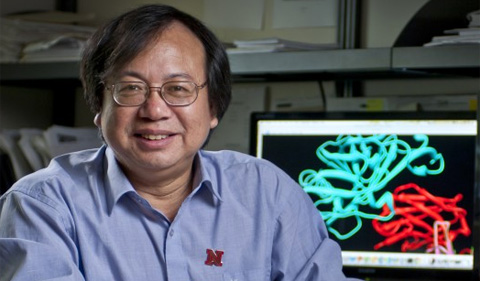Ohio University’s Chemistry and Biochemistry Colloquium Series presents Dr. Joel Rosenthal on “Efficient Conversion of Carbon Dioxide to Fuels using Bismuth Materials that Display Tunable Catalytic Profiles” on Monday, Mar. 4, 4:10 p.m. in Clippinger Laboratories 194.
Rosenthal is Associate Chair of Graduate Studies and Research with the Department of Chemistry and Biochemistry at the University of Delaware.
The Host Is: Travis White
Abstract: The electrochemical reduction of CO2 provides a pathway to address current issues in solar energy storage and the sustainable production of fuels. Many such approaches, however, have been hampered by a lack of affordable platforms that can efficiently promote CO2 valorization with high selectivity and reasonable kinetics. It is in response to this need that we have developed inexpensive cathode materials comprised of post-transition metals for conversion of CO2 to CO, HCO2H and other value-added reduced carbon compounds. We find that these platforms are easily prepared and the outcome of CO2 conversion can be tuned in the presence of varied room-temperature ionic liquids (RTILs). For example, we have prepared and studied a class of bismuthbased materials that promotes the reduction of CO2 to CO with fast kinetics and high efficiencies in the presence of imidazolium ([Im]+) based RTILs. A multipronged initiative has elucidated the mechanistic pathways and molecular design principles that drive conversion of CO2 to CO at the Bi/[Im]+ interface. We will discuss how integrated spectroscopic (XPS, XAS, XR, etc.) electroanalytical and computational methods have been used to interrogate the dynamics between electrocatalyst, RTIL and CO2 at the
cathode/electrolyte interface to provide insight into the pathway(s) by which the Bi/[Im]+ platform activates CO2. We have also evaluated the electrochemistry of the Bi-cathodes in the presence of non-[IM]+ RTILs. These studies reveal that subtle modification of the RTIL structure, leads to a significantly different catalysis with CO2. Electrolysis of CO2 over Bi in the presence of RTILs generated from the organic base DBU promotes the reduction of CO2 to yield formate (instead of CO) via an orthogonal CO2 activation pathway. The ‘catalytic plasticity’ that is displayed by Bi/[RTIL] platforms, along with implications for future discovery of catalyst/electrolyte combinations that can enable CO2 conversion and solar fuels production will be discussed.




















Comments